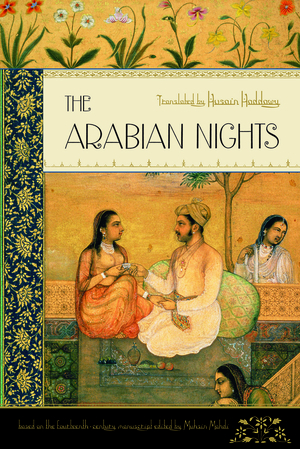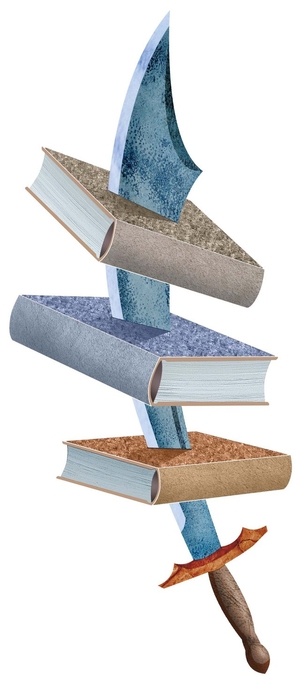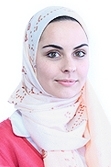At this moment of sequester and belt-tightening, the U.S. government has delivered a reading list on Islam.
 My alternative bibliography. |
As one of the taxpayers who unwittingly contributed to this project as well as the compiler of my own bibliography on Islam and the Middle East, I take interest in the 25 books NEH selected for glory, spreading them around the country.
 Some of the books, such as "The Arabian Nights," do have beautiful covers. |
NEH's list and mine do share minor commonalities: for example, one author (the Moroccan writer Fatima Mernissi) and one series (the Very Short Introductions series issued by Oxford University Press).
But our purposes could not be more different: whereas I help readers understand why Muslims fill 30 out of 32 slots on the most wanted terrorists list and how Islamism came to be the main vehicle of barbarism in the world today, the endowment's list shields the reader's eyes from all this unpleasantness. Where I provide background to the headlines, NEH ignores them and pretends all is well with Islam, as is the federal government's wont.
I seek to answer burning questions: Who was Muhammad? What is the historical impact of Islam? When is warfare jihad? Why did Islamism arise? How does tribal culture influence political life? Where can one locate signs of hope for Islam to moderate? In contrast, the NEH list offers a smattering of this and that – poetry, personal accounts, antiquities, architecture, religion and history, original texts, and a smidgeon of current events, preferably presented fictionally. For example, In the Country of Men by Hisham Matar, tells about a boy growing up in Qaddafi's Libya.
 The "Washington Times" illustration for this article. |
My books are personal selections based on decades in the field; theirs is a mish-mash brokered by a committee of four standard-issue academics (Leila Golestaneh Austin, Giancarlo Casale, Frederick Denny, and Kambiz GhaneaBassiri) and one don't-rock-the-boat journalist (Deborah Amos).
The NEH bibliography reminds one of the Middle East Studies Association's annual meetings, which often avoid interesting or important topics in favor of such obscure feminist issues as "Problematizing 'Women's Place' in the Multiple Borderzones of Gender and Ethnic Politics in Turkey" and "The Turkish Women's Union and the Politics of Women's Rights in Turkey, 1929-1935."
As these titles suggest, today's scholars have a strange tendency to focus on questions no one is asking, as do many of the NEH books. Anthony Shadid recounts in House of Stone: a Memoir of Home, Family, and a Lost Middle East his efforts to restore an ancestral home in Lebanon; Kamila Shamsie's Broken Verses: a Novel tells the story of a television journalist in Karachi.
As taxpayer and as specialist, I condemn the NEH list. Far from presenting "new and diverse perspectives," it offers the usual academic obfuscation mixed with Islamist triumphalism. It reminds us that of the many things governments should not do, one of them is to compile bibliographies.
Mr. Pipes (DanielPipes.org) is president of the Middle East Forum. © 2013 by Daniel Pipes. All rights reserved.
May 23, 2013 addenda: (1) To protest this bibliography, here is the address for Building Bridges: bridgingcultures@neh.gov
(2) Here is the complete list of books from the NEH list:
- A Quiet Revolution by Leila Ahmed
- Acts of Faith by Eboo Patel
- The Arabian Nights edited by Muhsin Mahdi
- The Art of Hajj by Venetia Porter
- Broken Verses by Kamila Shamsie
- The Butterfly Mosque by G. Willow Wilson
- The Children of Abraham by F. E. Peters
- The Columbia Sourcebook of Muslims in the United States edited by Edward E. Curtis IV
- The Conference of the Birds by Farid al-Din Attar
- Dreams of Trespass by Fatima Mernissi
- House of Stone by Anthony Shadid
- The House of Wisdom by Jim Al-Khalili
- In an Antique Land by Amitav Ghosh
- In the Country of Men by Hisham Matar
- Islamic Arts by Jonathan Bloom & Sheila Blair
- Leo Africanus by Amin Maalouf
- Minaret by Leila Aboulela
- Muhammad: A Very Short Introduction by Jonathan A.C. Brown
- The Ornament of the World by Maria Rosa Menocal
- Persepolis: The Story of a Childhood by Marjane Satrapi
- Prince Among Slaves by Terry Alford
- Rumi edited by Reynold A. Nicholson
- Snow by Orhan Pamuk
- The Story of the Qur'an by Ingrid Mattson
- When Asia Was the World by Stewart Gordon
May 30, 2013 update: The program is indeed turning up around the country. From a press release published in Bainbridge, Georgia:
Bainbridge State College's Library received a $4,500 grant from the National Endowment for the Humanities (NEH) and the American Library Association (ALA) to host a five-part reading and discussion series titled "Let's Talk About It: Muslim Journeys."
BSC's library is one of 125 libraries and state humanities councils across the country selected to participate in the project, which seeks to familiarize public audiences in the United States with the people, places, history, faith and cultures of Muslims in the United States and around the world. The Muslim Journeys theme the college library has chosen to explore is "Points of View." ...
In January, the NEH awarded BSC a collection of books, films and other resources as part of the Muslim Journeys Bookshelf. ...
BSC Vice President for Academic Affairs Tonya Strickland said the book discussions would be memorable experiences. ... The books to be discussed are "Broken Verses" by Kamila Shamsie, "Dreams of Trespass" by Fatima Mernissi, "House of Stone" by Anthony Shadid, "In the Country of Men" by Hisham Matar and "Persepolis: The Story of a Childhood" by Marjane Satrapi. The discussion series will run from this September to March 2014.
June 18, 2013 update: Another grant, this one also for $4,500 from the National Endowment for the Humanities and the American Library Association, to Eastern Illinois University's Booth Library to host "Lets Talk About It: Muslim Journeys."
"We are delighted to have been chosen to host this unique series that will allow citizens of East Central Illinois a chance to explore and discuss some important themes in Muslim history and literature with the help of well-qualified scholars," said Allen Lanham, dean of library services. ... Through the grant, the library will host a five-part book discussion moderated by these project scholars and Booth Library staff. A limited number of free books will be available for participants in the series. ... In association with the grant, Booth will sponsor a semester-long programming series on Muslim culture during the spring semester of 2014. ... All events will be free and open to the public.
July 18, 2013 update: And now the Dearborn Public Library received $3,500 from NEH and ALA for a five-part reading and discussion series, "Let's Talk About It: Muslim Journeys, Connected Histories." Isabella Rowan, project director and librarian at Henry Ford Centennial Library, commented:
We are excited for the opportunity to offer our patrons this unique scholarly experience right here at their local library. The 'Let's Talk About It' series is the equivalent of a college-level class, except it's free and there are no exams. ... The Muslim journey through time has impacted our global humanity in profound and inspiring ways. Reading these books and joining these discussions may challenge some of your ideas about the past, but, hey, let's talk about it.
Ameena Mirza Qazi of CAIR.
July 22, 2013 update:The University of Redlands in California has announced its "Muslim Journeys" events. It's got the usual verbiage ("Learn more about the peoples, places, histories, faith, and cultures of Muslims in the United States and around the globe"), with one difference: the second of three speakers is Ameena Mirza Qazi; the ad does not give her affiliation but she is deputy executive director and staff attorney at the Los Angeles office of the Council on American-Islamic Relations ("She handles legal cases and provides legal advice to community members on civil rights issues"). So, (1) the U.S. government is legitimating a CAIR apparatchik and (2) the taxpayer is funding her.

Aug. 5, 2013 update: The Reporter-Herald of Loveland, Colorado, provides a purple-prose account ("opportunity to escape from the heat of summer and cool off with the wonders of the Islamic world and its art") of the Muslim Journeys offering at the public library.
Oct. 23, 2013 update: "Sessions Investigates Grant Process, Questionable Use of Funds at National Humanities Endowment" reads the press release issued by U.S. Sen. Jeff Sessions (Republican of Alabama and ranking member of the Senate Budget Committee). It includes the text of a letter sent to NEH's Acting Chairman Carol Watson that, among other topics, asks about "the expenditure of public funds to distribute books related to Islam to 900 libraries across the country" in what he calls the "Bridging Cultures Bookshelf Administration" program.
Recent press reports indicate that NEH has launched a project to distribute books related to Islam to over 900 libraries across the United States, and to offer grants to book recipients to hold related forums. This triggers questions about what the Federal government is funding in this area, and the perspectives represented by the publications and forum organizers.
I would like to know more about how NEH determines what research actually contributes to public support and confidence in the use of taxpayer funds. To that end, please respond to the following:
1. Please explain the peer review process for all grants awarded in the education programs division, with a grant period after April 30, 2013.
2. Are all grants in the education programs division peer reviewed? If some grants do not undergo a peer review process, please explain why and how grant determinations are made, in absence of the review process.
3. Please provide the list of peer reviewers for all grants awarded in the education programs, with a grant period after April 30, 2013.
4. Please provide, on an individual basis, the number and total dollar amount of grants awarded to those participating as peer reviewers in the education programs division, with a grant period after April 30, 2013.
5. Please explain the peer review process for Bridging Cultures Bookshelf: Muslim Journeys.
6. Please provide a list of the peer reviewers for Bridging Cultures Bookshelf: Muslim Journeys.
7. Please provide an itemized list of all spending related to Bridging Cultures Bookshelf: Muslim Journey and any closely related projects.
8. One would think that NEH takes a fair and balanced approach to promoting culture. Please provide an itemized list, over the last five years, of all spending related to Christianity (e.g, Protestantism—Baptist, Methodist, Episcopal—or Catholicism) or Judaism where books or forums promoting one point of view were provided to libraries, etc.
The House, in the FY 2014 Interior and Environment Appropriations bill, has proposed to cut NEH funding by almost 50 percent. Using taxpayer dollars to fund education program grant questions that are very indefinite or in an effort to seemingly use Federal funds on behalf of just one religion, does not on its face appear to be the appropriate means to establish confidence in the American people that NEH expenditures are wise. Hopefully, your answers will help alleviate these concerns.
Please have your staff provide this information both in hard copy and in an electronic, searchable format no later than November 25, 2013.
Oct. 31, 2013 update: The Modern Language Association Executive Council has replied to Sen. Sessions:
The NEH-funded program "Muslim Journeys Bookshelf" targeted by Senator Sessions shows precisely that Islam is not a "foreign" religion, somehow separate from Christianity, Judaism, and American history. Islam and Muslims have been a part of America's fabric since the slave trade. Many of the books in "Muslim Journeys Bookshelf" feature American stories about and by former slaves who were Muslim. Another corner of the "Bookshelf" explores the deep interconnections of Islam and all the world's histories and cultures. These programs promote not one culture or religion over others but, rather, the values of education in a democracy.
Nov. 25, 2013 update: No sign so far of the NEH response, which I will post when available.
Nov. 25, 2014 update: Checking back a year later, I find no response to Sessions but NEH has published an "Impact Summary" complete with an interactive map showing events promoting "Muslim Journeys."
Jan. 5, 2017 update: CAIR opposes Sessions' nomination as attorney general and one reason is his 2013 letter to NEH.
More reports on "Muslim Journey" sessions:
- "Gilpin Library Footnotes," The Mountain Ear (Colorado), August 22, 2013.
- "Daisy Khan, Muslim Women's Activist and 'Ground Zero Mosque' Proponent, to Keynote 'Muslim Journeys' at LIU Post," Long Island University Post, September 16, 2013.
- Hatem Bazian, "I am leading five sessions in the Contra Costa Public Library with the Connected Histories Theme." Yahoo Groups, October 8, 2013.
- Westland Public Library, "Bridging Cultures: Muslim Journeys." October 19, 2013 and forward. Partnering with the Council on American-Islamic Relations, CAIR.
- Phil Bolton, "Islamic Speakers Bureau to Honor DeKalb Library and Marist School." October 23, 2013. Islamic Speakers Bureau to Honor DeKalb Library and Marist School, Jack Shaheen a speaker.
- Mike Osborne, "Muslim Journey's Bookshelf Series Continues at MTSU." November 14, 2013. About Moustafa Bayoumi discussing his book How Does It Feel to Be a Problem? Arab-American Life and U.S. Foreign Policy at Middle Tennessee State University
- Elizabeth Stapula, "Muslim Leader Speaks Candidly about School and Freedom in America," The Rotunda, February 5, 2014. About Shaykh Abdullah Nooruddeen Durkee at the Greenwood Library Atrium discussing "Travels in Muslim Lands." He gave a doozie of a talk. Excerpts of Stapula's description:
"Salaam alaikum" Nooruddeen began with an Arabic greeting of peace, followed by his "high hopes" for America to soon become a Muslim land. A statement, he said, we ought not have been offended by. ... "Unfortunately...today education almost does not exist in America," Nooruddeen said in his first of many digressions, then going on to proclaim, "Very little education goes on in these walls;" a bold statement to make in a university setting. He cited that universities functioned primarily as a place of vocational study, despite having dropped out of high school and having never attended a university, himself. ... Nooruddeen questioned our collective belief in the American ideal of "the home of the free and the brave." ... Specifically, he called into question the actuality of a 747 hitting the Pentagon when taking into account the size of the hole and lack of titanium scrap at the site. ... "Where's the freedom and democracy?" Nooruddeen questioned, referencing an America that would enter into wars with unprovoked countries, and close schools in order to avoid race mixing. ... He then quoted Janis Joplin, saying "Freedom's just another word for nothing left to lose," and took a bow.
Comment: As a taxpayer, I am especially thrilled to have had a chance to help sponsor Nooruddeen.
- Walnut Creek Library Foundation (near San Francisco), "Let's Talk About It: Muslim Journeys," June 20, 2014. Presentation by Hatem Bazian, one of the most notorious Middle East studies specialists in the United States.

